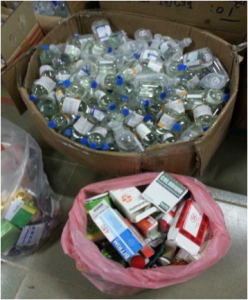Ive been working in the anti-counterfeit pharmaceutical industry in Cambodia for 7 years now and although I think Cambodia has made big in-roads into improving its pharmaceutical industry, I believe that the biggest issue it faces now and going forward, is improving its enforcement of laws and stopping the number of unqualified people working as doctors, nurses, dentists and pharmacists.
 I went to a well known pharmacy in Phnom Penh yesterday to buy some medicine for my wife and to my amazement the pharmacy had one of their young family members serving customers with no other adult person around. Given the fact that the girl was still wearing her high school uniform, added to my suspicion that she wasn’t a qualified pharmacist and yet she was selling heart and diabetes medicines to two older ladies.
I went to a well known pharmacy in Phnom Penh yesterday to buy some medicine for my wife and to my amazement the pharmacy had one of their young family members serving customers with no other adult person around. Given the fact that the girl was still wearing her high school uniform, added to my suspicion that she wasn’t a qualified pharmacist and yet she was selling heart and diabetes medicines to two older ladies.
Pharmaceutical products in an illegal supply chain are frequently distributed by unqualified persons in Cambodia. In 2015, as a result of a huge HIV outbreak in Cambodia caused by an unqualified person acting as a doctor, the Ministry of Health conducted an investigation and revealed that there was over 3000 unqualified doctors operating in the country (read article).
The pharmaceutical industry in Cambodia faces a significant problem in this regard: failures to control black market supply of medicine over a long period of time has lead to a boom in unqualified doctors and staff in medical clinics, pharmacies and even unregistered pseudo-clinics.
 Consider this example: a raid informed by SMCS Risk in late 2015 saw the seizure of over 5’000 dosage units of injectable medicine. This medicine was being stored in three houses, with livestock kept in close proximity in two of these locations. The owners of the houses had been injecting local patients with this illegal medicine: none of the offenders had medical qualifications.
Consider this example: a raid informed by SMCS Risk in late 2015 saw the seizure of over 5’000 dosage units of injectable medicine. This medicine was being stored in three houses, with livestock kept in close proximity in two of these locations. The owners of the houses had been injecting local patients with this illegal medicine: none of the offenders had medical qualifications.
These people have been encouraged to enter the pharmaceutical supply chain because of the widespread availability of illegal medicines. It represented an economic opportunity, with low perceived risks of being caught, and weak penalties for being caught. To this day, pre-judicial warnings prevail for those caught distributing illegal medicine in Cambodia.
This case is just the tip of the iceberg. Unlicensed and unqualified persons masquerading as medical professionals put patients at risk of misdiagnosis, unsuitable treatment and non-sterile medicine administration e.g. the use of re-used syringes.
The risks posed to the public by unqualified persons are extreme, threatening lives on a daily basis in Cambodia and unless authorities start strictly enforcing laws and prosecuting offenders. patients safety will continue to be poor and the chances of serious illness or even death will continue to be high.